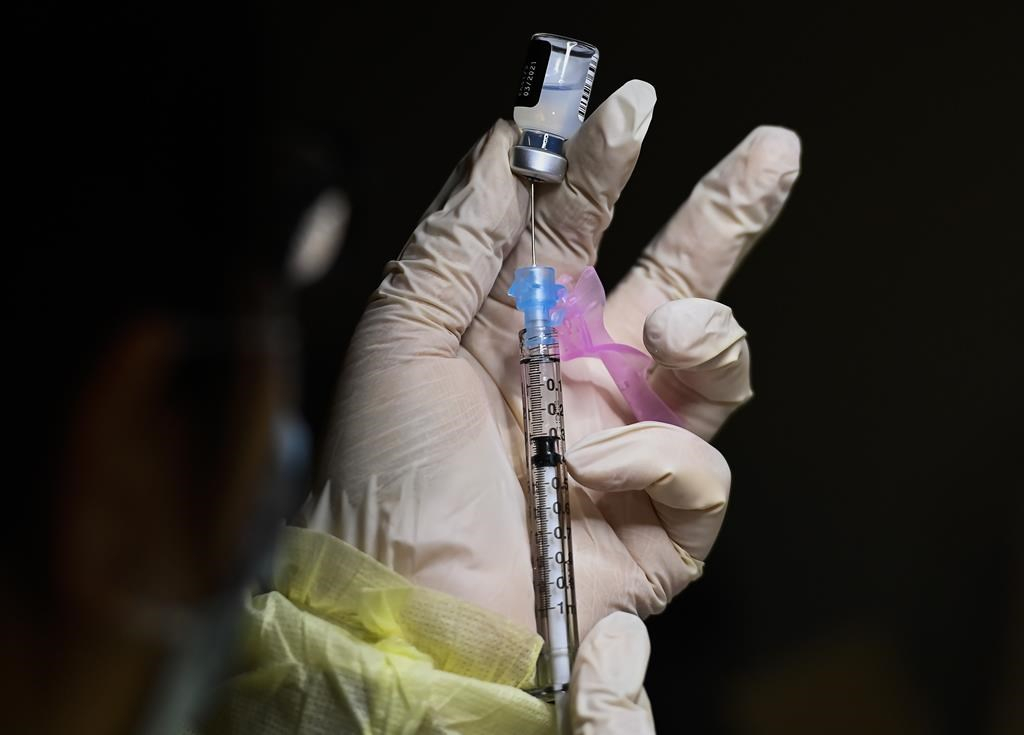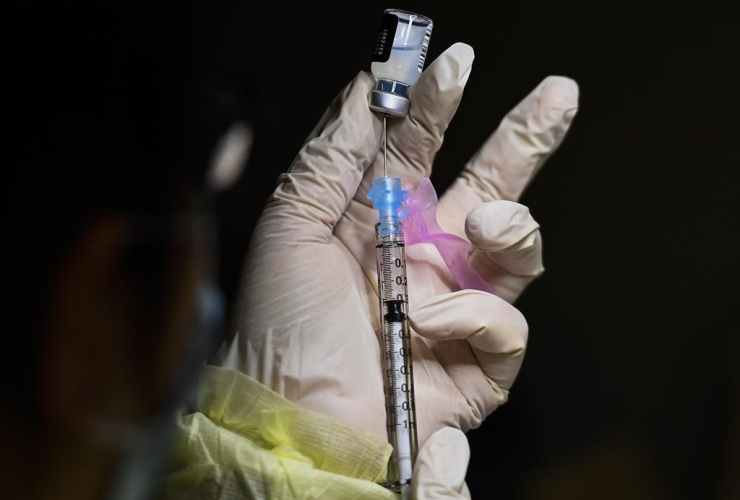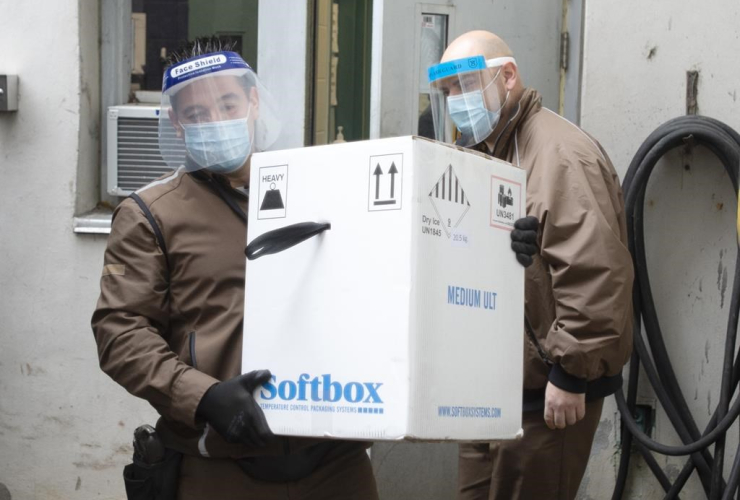Ontario hit a record Thursday for new daily COVID-19 cases as hospitals urged a month-long lockdown, while tougher restrictions took effect in Saskatchewan, Alberta recorded its highest death toll and a vaccine maker said vials may yield more doses than expected.
Priority groups such as health-care workers and seniors began receiving Canada's first doses of the Pfizer-BioNTech vaccine this week.
"The amount of any excess vaccine left in the vial can vary based on provider technique and ancillary supplies," Pfizer Canada spokeswoman Christina Antoniou said in an email.
"There may be excess vaccine in the vial after withdrawal of five doses, which in some cases may leave enough volume for an additional dose."
In the United States, news website Politico reported the extra amounts could increase the vaccine supply in the U.S. by 40 per cent.
Health Canada said in a statement that it's aware vials may contain more than the five doses of 0.3 millilitres indicated on the label.
It said there are safeguards against potential losses in volume that can happen during storage, preparation and administration of the vaccine, and that can result in an extra dose or two.
"Health Canada has no objections to health-care professionals drawing up an additional dose or two from each vial, where possible," the agency said.
"However, it is important to note that the mixing or pooling of volumes from separate vials is not recommended as it could result in cross contamination, loss of product sterility or improper dosing."
Meanwhile, Canada's most populous province reported 2,432 new infections and 23 deaths.
To protect the health-care system from a surge in patients, the Ontario Hospital Association pushed for a four-week lockdown in every public health unit with an infection rate of 40 or higher per 100,000 people.
"We are now in the holiday season and if members of the public choose to ignore public health measures and gather outside their households, the consequences risk overwhelming Ontario’s hospitals," the association said.
"Every health-care system has its breaking point."
Premier Doug Ford said his Progressive Conservative government would continue to consult with hospital leadership.
"It's very, very concerning, the situation we're facing right now," Ford said. "Right now everything is on the table and we always take advice from the medical experts."
He said there would be additional help for small business owners affected by any expanded health measures.
In Saskatchewan, residents awoke to new public health orders that include no longer having guests in their homes, with a few exceptions. It's one of several new rules in place until at least Jan. 15.
There is also a 10-person cap on outdoor socializing. Starting Saturday, bingo halls and casinos must also close, and personal care services, such as hairdressers, have to cut their capacity in half.
Retailers have until Christmas Day before they also need to drop to 50 per cent capacity. Larger stores will be limited to 25 per cent.
Seven more people in the province died of COVID-19, pushing total fatalities to more than 100. Saskatchewan recorded another 238 cases and 126 people were in hospital.
Alberta reported 30 additional deaths — its highest daily tally yet — bringing its total to 790. There were 1,571 new cases, 763 people hospitalized and 138 of those in intensive care.
Chief medical officer Dr. Deena Hinshaw said extra vaccine in vials would be given when possible.
"If you have a very skilled immunization administrator, who's able to withdraw exactly the amount needed and no more, it is possible that some vials may be able to provide enough for six doses of vaccine," she said.
Quebec Health Department spokesman Robert Maranda echoed that sentiment. "Rest assured that no doses of vaccine will be left."
That province was preparing to open another 21 COVID-19 vaccination sites by Monday in addition to two that opened earlier this week at long-term care homes in Montreal and Quebec City.
The province reported 1,855 new cases and 22 more deaths Thursday. There were also more than 1,000 people in hospital with the virus for the first time since June.
Manitoba had 221 new cases and 14 additional deaths. Daily case counts have been on a downward trend since restrictions were imposed on gatherings and businesses last month.
British Columbia's top doctor advised people with chronic health conditions to contact their family doctor to determine if they should get vaccinated for COVID-19.
Dr. Bonnie Henry said the Pfizer vaccine was tested primarily on healthy people of varying ages and it's not known if it will work or is safe for those with chronic liver or kidney diseases, for example.
Henry said 1,215 health-care workers have so far been vaccinated in the province, and about 380,000 people are expected to be immunized by March.
B.C. announced 673 new cases of COVID-19 and 21 more deaths.
A Statistics Canada report released Thursday said 97 per cent of Canadians surveyed in September reported they wore a mask in public when physical distancing was difficult.
The analysis, part of the Canadian Community Health Survey, also found three-quarters would get a COVID-19 vaccine when available. The willingness was highest in Prince Edward Island and lowest in Alberta.
— With files from Mia Rabson in Ottawa.
This report by The Canadian Press was first published Dec. 17, 2020.





Comments